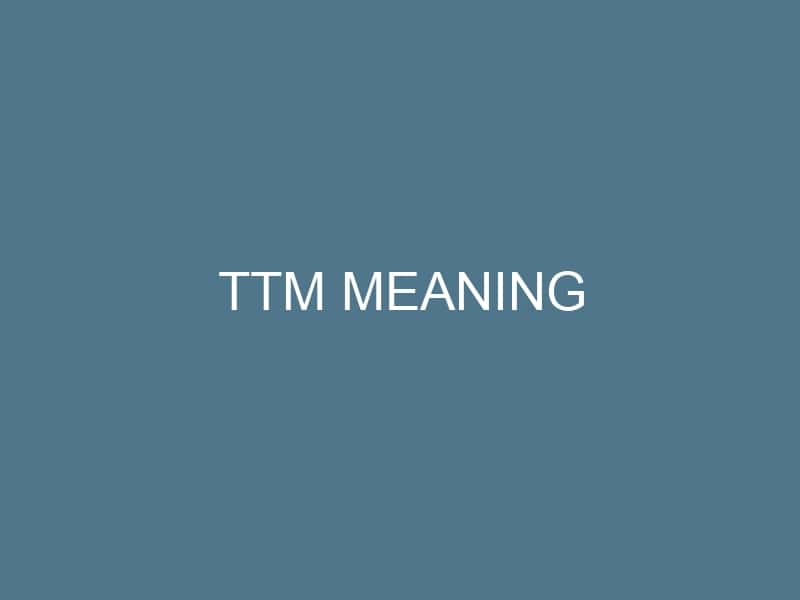The digital landscape is not only about the technologies we use but also the vernacular that evolves within it. Internet slang, once confined to the realms of chat rooms and instant messaging, now permeates every aspect of our online interactions. “TTM,” short for “Talk To Me,” is one such piece of internet vernacular that has gained traction across various platforms. In this comprehensive guide, we will demystify TTM and delve into an array of other internet slang that keeps conversations flowing swiftly and colorfully in the digital age.
| Key Takeaways | Explanation |
|---|---|
| TTM Meaning | “Talk To Me,” an invitation to converse or show of availability to chat. |
| Internet Slang Impact | Abbreviations aid in faster communication and serve as cultural shorthand, reflecting digital identities. |
| IHHT Context | “I Hate How True,” used to agree with unpleasant but true sentiments. |
| LMS Usage | “Like My Status,” a call for engagement on social media posts. |
| IMU in Conversations | “I Miss You,” conveys longing in a succinct manner, often in messages or posts. |
| HYB Significance | “How Ya Been?” serves as a casual check-in or shows concern for one’s state of being. |
| FYP Role | “For You Page,” a hashtag critical for content visibility and navigation on platforms like TikTok. |
| SMDH Meaning | “Shaking My Damn Head,” expressing disapproval or disbelief in a more intense form. |
| BFFR, IKYFL, GRWM | Acronyms that foster bonds, share shock, or engage in community activities such as “Get Ready With Me.” |
| WTD and OMM | Slang for questioning (“What’s The Deal?”) or expressing surprise (“On My Momma”). |
| OFC Assertion | “Of Course,” used to confirm statements with conviction, denoting a strong agreement. |
This table summarizes the principal elements of internet slang discussed in the article, providing a quick reference guide to some of the most common and impactful terms shaping our online communication today.
Understanding TTM: More than Just Letters
TTM, which stands for “Talk to Me,” is often used to encourage a conversation or to indicate that someone is willing to listen. It’s a straightforward abbreviation that arose from the fast-paced nature of online communication, where brevity is highly valued. When someone uses TTM:
- It can signal an invitation for someone to share information or feelings.
- It might also express the sender’s availability and desire to chat.
In the varied tapestry of online chatter, TTM fits into casual and informal dialogue, deployed among friends, acquaintances, or even within interest-based communities.
A World of Abbreviations: Decoding Digital Dialogue
The proliferation of abbreviations like TTM is partly due to the instantaneous nature of online communication. Abbreviations help to convey messages faster, which is crucial in the quick-scrolling world of social media and instant messaging. Additionally, they can add a layer of emotional nuance or intention to otherwise plain text. The impact of digital abbreviations includes:
- Fostering swifter exchanges: Reducing phrases to their initials saves time for both the sender and receiver.
- Cultural shorthand: These terms often become markers of belonging to certain online communities or generational groups.
Internet slang can also be seen as a reflection of our digital identities, helping us express who we are and how we relate to others in the online realm. However, navigating the line between maintaining professionalism and relatability can be a delicate balance to achieve.
Beyond TTM: Exploring Other Internet Slang Terms
IHHT and Its Place in Online Exchanges
The meaning behind IHHT, “I Hate How True,” resonates with users who encounter relatable yet frustrating truths. It’s often used:
- When agreeing with a sentiment that one wishes were not accurate.
- To express a reluctant acknowledgment of a somewhat unpleasant fact.
The Significance of LMS in Social Media Interactions
The LMS meaning, “Like My Status,” is a direct plea for engagement on platforms like Facebook or Instagram. It’s typically used:
- To solicit likes and interaction on a post one feels proud of or wants to draw attention to.
- As part of games or challenges where liking a status may lead to a reciprocal action.
Unlocking the Essence of IMU in Conversation
Understanding the emotional context behind IMU meaning—or “I Miss You”—is essential. It’s a concise way to express a poignant emotion and is often seen:
- In personal messages or public posts directed to someone who is physically or emotionally distant.
- As part of reminiscing about a shared memory or experience.
HYB: A Call for Updates or More?
The interpretation of HYB meaning, “How Ya Been?” depends on the context. This slang can serve multiple scenarios:
- As a casual greeting in a conversation after a period of no contact.
- To show genuine concern or curiosity about someone’s well-being.
Navigating the Hashtag Jungle: From FYP to SMDH
FYP: A Hashtag that Shapes Content Visibility
The influence of FYP meaning—namely, “For You Page” on platforms like TikTok—extends beyond casual use, impacting how content is discovered and shared. It’s integral for:
- Creators looking to increase their reach in the recommendation algorithms.
- Users who want to navigate and curate their personal content feeds more effectively.
The Exasperated World of SMDH
To express frustration, the SMDH meaning—”Shaking My Damn Head”—captures a stronger sentiment than a simple eye roll. It conveys:
- Disapproval or disbelief in response to a situation or statement.
- A nonverbal gesture of disapproval, adapted for text-based communication.
Closing Thoughts on Internet Slang
BFFR, IKYFL, GRWM: The Acronyms That Bond Us
These acronyms encapsulate the shared experiences and resonant moments among users:
- The closeness indicated by BFFR meaning, “Best Friends For Real,” strengthens bonds.
- The astonishment or disbelief emphasized by IKYFL meaning, “I Know You’re F-ing Lying,” delivers a humorous shock.
- The trendy and inclusive activity represented by GRWM, “Get Ready With Me,” invites users into personal routines.
Decoding the Intents of WTD and OMM
The intentions behind questions can be compactly encapsulated in slang:
- Querying actions or plans with WTD meaning, “What’s The Deal?”
- Expressing moments of surprise or realization with OMM meaning, “On My Momma.”
OFC: The Affirmation That Needs No Question
The assertiveness of OFC meaning, or “Of Course,” denotes a strong agreement and is used:
- To confirm statements or answers without the need for further clarification.
- As an indicator of conviction or assuredness in one’s response.
The landscape of internet slang is a reflection of our culture in the digital era—shaped by creativity, emotion, and the desire for efficient communication. Whether it’s through a simple TTM or a more complex acronym like GRWM, these terms help us navigate the ebb and flow of online conversations. By staying informed about these nuances, we can participate confidently and effectively in the ever-evolving world of online interaction.







